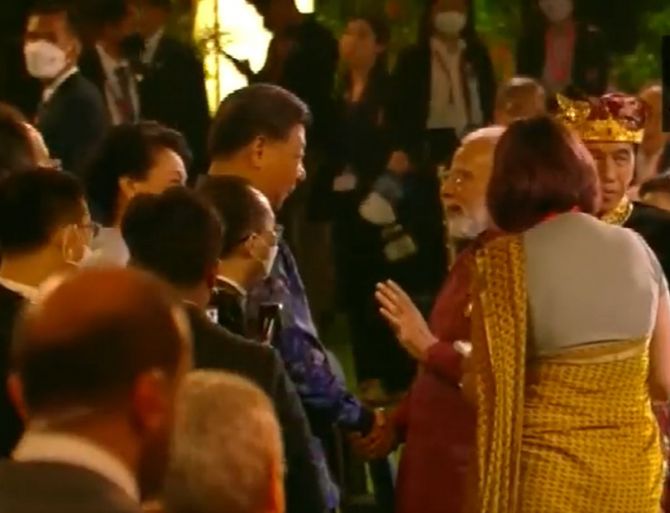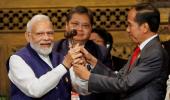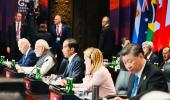Modi on the global stage always comes across as a statesman, counselling peace and amity to world leaders even as his policies at home hurt certain sections, explains Virendra Kapoor.

India takes over the G-20 presidency on December 1, 2022. Photograph: Kind courtesy PM Modi/Twitter
The Congress party apprehends that Prime Minister Narendra Modi will exploit the presidency of the G-20 hroup to further burnish his domestic image. Of course, its fears are valid.
But is there anything either in law or in good parliamentary practice that bars an elected leader to put to good use his rising global profile for domestic consumption?
If Modi has turned out to be an able and astute player on the international stage not only is it good for him, but, more importantly, it is good for the country as well.
After all, raising India's profile in the global fora yields a whole variety of tangible and not-so-tangible benefits such as enhanced trade, more travel and work visas etc for the country and its citizens.
Besides, it boosts the morale of the people that the leader of their country is playing an active role in various international forums.
The Congress fears that with Modi having taken over the baton from Indonesia's President Joko Widodo at the G-20 summit in Bali, he is bound to exploit the year-long headship of one of the more significant global fora for electoral purpose months ahead of the 2024 Lok Sabha election.
The fact that the Opposition criticised the prominent placement of lotus in the G-20 logo, which Modi unveiled along with its theme before going to Bali, provides an early confirmation of the desire to exploit the international summitry for domestic purposes.
Congress spokesperson Jairam Ramesh's objection to the lotus in the G-20 logo, however, drew a sharp riposte from the BJP which said the 'lotus is a symbol of hope -- no matter how dire the circumstances, the lotus still blooms'.

The theme of India's G-20 presidency is evocative: 'One Earth, One Family, One Future'.
Whether the secular liberals countered how they wish that theme also informed the Modi government's domestic policies we are not aware.
But then, Modi on the global stage always comes across as a statesman, counselling peace and amity to the world leaders even as his policies at home hurt certain sections, especially Muslims.
Be that as it may, if Modi is exploiting his international persona for burnishing his image at home, he will not be the first leader to do so.
Jawaharlal Nehru, India's first prime minister, was severely criticised at home for his obsession to play peace-maker on the world stage.
As a co-founder of the now defunct Non Aligned Movement, Nehru often riled the US-led West during the Cold War by constantly 'lecturing' the world about peace and harmony.
His words carried little weight given that the Indian economy was in tatters, unable to feed its teeming millions, dependent as it was on imports of foodgrain from America.
Admittedly, India's economy has undergone a great transformation from the Nehru era. We now export food worth billions of dollars annually.
Since the economic liberalisation of the early 1990s, the Indian economy, the fifth largest globally, is among the fastest growing in the world.
Small wonder, then, India's leaders are heard with respect in multilateral fora.
Besides, instead of moralising and preaching in global fora, which is what Nehru was accused of doing by his critics, pragmatism and national interest alone informs our foreign policy, especially since 2014 when Modi first became prime minister.

At the recent G-20 summit, Modi's contribution was significant.
Though Russia's aggression against Ukraine dominated the summit, it was the Indian prime minister's specific words spoken to the Russian dictator in a face-to-face meeting on the side lines of the conference of the Shanghai Cooperation Organisation in Samarkand in September which echoed at the Bali summit.
'Today is not the era of war', Modi told Vladimir Putin while asking him to end the armed hostilities against a fellow independent and sovereign nation.
The independent course pursued by India in foreign relations was once again brought out at the Bali summit.
While the US and leaders of other countries in its orbit sought to condemn Russia for its war against Ukraine, Modi pointedly refused to join them while, at the same time, pressing for an immediate cessation of armed hostilities.
This was a rare occasion when India and China took the same stand, though India's was more nuanced.
Both China and India pointed out that G-20 was not the appropriate forum for discussing security issues.
Discerning foreign policy watchers would have noticed how despite its refusal to toe the US line on Ukraine, despite India defying the US-led sanctions against Russia, American leaders still seek closer ties with New Delhi.
It is notable that only after the US sanctions has Russia become India's main source for oil imports.

The fact is that a new global scenario is emerging with fresh lines being drawn, with Russia being replaced by China as the chief protagonist against the US in the Cold War II.
Russia, a much diminished power as borne out by its serial reverses in Ukraine, now feels obliged to play second fiddle to China.
In the growing tussle between the US and China, Russia alone is a major country supporting the latter.
As for India, the US treats it with due respect, considering it as a solid bulwark against an aggressive China determined to play the new hegemon in Asia and beyond.
That explains various security-specific groups such as Quad, comprising the US, India, Australia and Japan, which seek to uphold a rule-based order in the Indo-Pacific in the face of an expansionist China which treats the entire region as its exclusive zone of influence.
To come back to the domestic use of the global summitry even before he returned from Bali social media platforms were flooded with pictures of Modi confidently interacting with various world leaders.
The 'bhaktw' will be filled with pride at their leader exuding confidence at a global forum.

In what was a significant vignette at the Bali summit was the handshake between Modi and Chinese autocrat Xi Jinping.
Because it was captured on camera at Bali while such an opportunity had eluded the media at the SCO summit in Samarkand in September, the resulting photograph of the two leaders whose countries are locked in a bitter stand-off at the border drew much public interest.
Columnist Virendra Kapoor -- former editor of the Free Press Journal and Onlooker magazine was jailed for his views during the Emergency.
You can read his earlier columns here.
Feature Presentation: Aslam Hunani/Rediff.com











 © 2025
© 2025